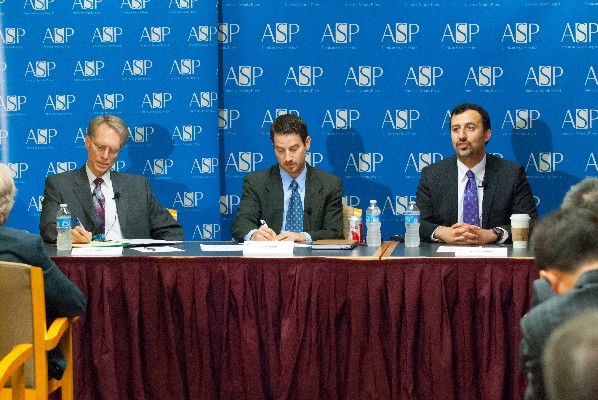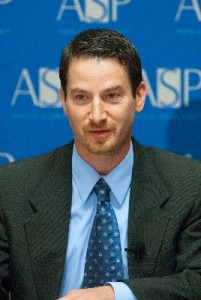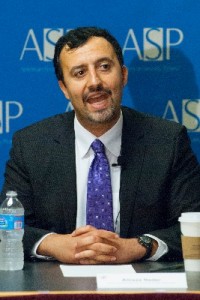
Event Recap: Prospects for a Diplomatic Solution in Iran
In light of the recent events in Syria, the question whether to address Iran, either diplomatically or militarily, and directly or indirectly, is being grappled with by the West. Today, the American Security Project hosted an event titled “Prospects for a Diplomatic Solution in Iran.” The panelists had diverse backgrounds of expertise on Iran: Greg Thilemann, Senior Fellow for the Arms Control Association, Joel Rubin, Director of Policy and Government Affairs for the Ploughshares Fund, and Alireza Nader, International Policy Analyst for the RAND Corporation.
 Greg Thielmann delivered an overview of the current Iranian nuclear situation. Iran is slowly but gradually adding centrifuges to nuclear facilities around the country; Additionally, Iran has been enriching some of its stockpiles of fissile material to weapon grade levels of ninety percent. Although Iran has made progress on its uranium enrichment and weapons systems, it is largely minimal in the historical scheme of the past thirty years and in light of the unlikely forecasted projection of acquiring nuclear weapons by 2015. Iran has refused to comply with all aspects of the Non-Proliferation Treaty, but has permitted the International Atomic Agency to gain access to various nuclear facilities.
Greg Thielmann delivered an overview of the current Iranian nuclear situation. Iran is slowly but gradually adding centrifuges to nuclear facilities around the country; Additionally, Iran has been enriching some of its stockpiles of fissile material to weapon grade levels of ninety percent. Although Iran has made progress on its uranium enrichment and weapons systems, it is largely minimal in the historical scheme of the past thirty years and in light of the unlikely forecasted projection of acquiring nuclear weapons by 2015. Iran has refused to comply with all aspects of the Non-Proliferation Treaty, but has permitted the International Atomic Agency to gain access to various nuclear facilities.
 Joel Rubin indicated three strategic themes on the current conflict in Syria that are insightful for diplomatic initiatives with Iran. First, it is always darkest before dawn – just when everything seems bleak and all is lost, a channel or window of opportunity emerges that can potentially resolve the issue. Second, the President must push for results but only can do so far as his team can realistically assist him; doing nothing could be disastrous for America, and the government officials of the U.S. must step up and engage their adversaries as much as possible. Third, Congress is coequal with the President and should be included in this decision-making process. Rubin declared, “President Obama was correct in asking for authorization of military force in Syria; this action shows he puts faith in America’s system that the founders established.” Even if Obama is denied authorization, the loss will be recoverable – President George W. Bush had done it before in the Iraq war and President Obama has the next three years and four months to repair his reputation.
Joel Rubin indicated three strategic themes on the current conflict in Syria that are insightful for diplomatic initiatives with Iran. First, it is always darkest before dawn – just when everything seems bleak and all is lost, a channel or window of opportunity emerges that can potentially resolve the issue. Second, the President must push for results but only can do so far as his team can realistically assist him; doing nothing could be disastrous for America, and the government officials of the U.S. must step up and engage their adversaries as much as possible. Third, Congress is coequal with the President and should be included in this decision-making process. Rubin declared, “President Obama was correct in asking for authorization of military force in Syria; this action shows he puts faith in America’s system that the founders established.” Even if Obama is denied authorization, the loss will be recoverable – President George W. Bush had done it before in the Iraq war and President Obama has the next three years and four months to repair his reputation.
 Alireza Nader discussed the domestic climate of Iran and the effects of the West’s actions on Iran’s well-being. The recent election of President Rouhani was largely a surprise to the experts and analysts of Iran. Contrary to popular understanding, Rouhani is not a transformative figure or a reformist; he is a conservative cleric that was the National Security Advisor to two former Iranian President for over a decade. However, this does not preclude him from facilitating positive change; Nader noted it is “because he is a part of the system, he can lead Iran to a potentially successful diplomatic solution.” Although many people cite the subordinate nature of his position as President, since it is less influential than the Supreme Ayatollah’s Khomeini’s powers, Rouhani exerts influence by appointing governmental officials and overseeing the development of the economy. This is important in understanding as “Rouhani has appointed officials that are less ideological and more moderate – increasing the pragmatic nature of the administration.” With the recent consideration of a political settlement of the Syrian conflict – the proposal of transferring chemical weapons from Syria to Russia under the auspice of international control – affords the opportunity for the United States to engage Iran considering its influence and potential capabilities in the region.
Alireza Nader discussed the domestic climate of Iran and the effects of the West’s actions on Iran’s well-being. The recent election of President Rouhani was largely a surprise to the experts and analysts of Iran. Contrary to popular understanding, Rouhani is not a transformative figure or a reformist; he is a conservative cleric that was the National Security Advisor to two former Iranian President for over a decade. However, this does not preclude him from facilitating positive change; Nader noted it is “because he is a part of the system, he can lead Iran to a potentially successful diplomatic solution.” Although many people cite the subordinate nature of his position as President, since it is less influential than the Supreme Ayatollah’s Khomeini’s powers, Rouhani exerts influence by appointing governmental officials and overseeing the development of the economy. This is important in understanding as “Rouhani has appointed officials that are less ideological and more moderate – increasing the pragmatic nature of the administration.” With the recent consideration of a political settlement of the Syrian conflict – the proposal of transferring chemical weapons from Syria to Russia under the auspice of international control – affords the opportunity for the United States to engage Iran considering its influence and potential capabilities in the region.
In the question and answer session that followed, one of the topics that was emphasized by all three panelists was the importance of sanctions. Nader highlighted that “getting Iran back to a major oil exporter is priority number one of Iran.” As such, the U.S. wields considerable influence through its sanctions and can utilize it as a point of leverage. However, this is only possible if the U.S. engages with Iran, and doesn’t try to further exacerbate the situation by placing additional sanctions on the Islamic Republic. Rubin added to the importance of this argument, highlighting the significance of giving the President the “flexibility to waive sanctions or even reduce them” (which some sanction legislation precludes), as a potential diplomatic bargaining chip. Moreover, Thielmann asserted that sanctions have inhibited the development of Iran’s missile and nuclear program capabilities, but is only effective so far as the President can amend these sanctions.
All the panelists seem to concur that now is the opportunity for America to truly take the initiative to forge a diplomatic solution with Iran. Whether that will be at the P5 + 1, at the U.N., in a formal meeting, or through back channels, is unclear – but the importance of resolving this issue surely is.
Prospects for a Diplomatic Solution with Iran, a set on Flickr.
















[…] piece was delivered as prepared remarks at a panel about “Prospects for a Diplomatic Solution in Iran” organized by the American Security […]